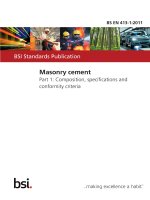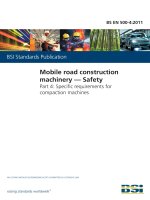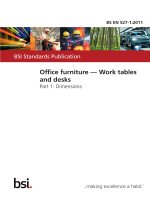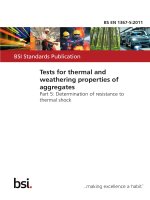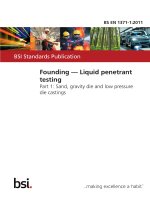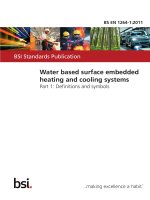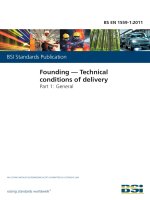Bsi bs en 61386 25 2011
Bạn đang xem bản rút gọn của tài liệu. Xem và tải ngay bản đầy đủ của tài liệu tại đây (1.1 MB, 22 trang )
BS EN 61386-25:2011
BSI Standards Publication
Conduit systems for
cable management
Part 25: Particular requirements
— Conduit fixing devices
BRITISH STANDARD
BS EN 61386-25:2011
National foreword
This British Standard is the UK implementation of EN 61386-25:2011. It is
identical to IEC 61386-25:2011.
The UK participation in its preparation was entrusted to Technical Committee
PEL/213, Cable management.
A list of organizations represented on this committee can be obtained on
request to its secretary.
This publication does not purport to include all the necessary provisions of a
contract. Users are responsible for its correct application.
© BSI 2011
ISBN 978 0 580 65649 1
ICS 29.120.10
Compliance with a British Standard cannot confer immunity
from legal obligations.
This British Standard was published under the authority of the
Standards Policy and Strategy Committee on 31 December 2011.
Amendments issued since publication
Amd. No.
Date
Text affected
BS EN 61386-25:2011
EUROPEAN STANDARD
EN 61386-25
NORME EUROPÉENNE
November 2011
EUROPÄISCHE NORM
ICS 29.120.10
English version
Conduit systems for cable management Part 25: Particular requirements Conduit fixing devices
(IEC 61386-25:2011)
Systèmes de conduits pour la gestion du
câblage Partie 25: Exigences particulières Dispositifs de fixation de conduit
(CEI 61386-25:2011)
Elektroinstallationsrohrsysteme für
elektrische Energie und
für Informationen Teil 25: Besondere Anforderungen für
Rohrhalter
(IEC 61386-25:2011)
This European Standard was approved by CENELEC on 2011-10-27. CENELEC members are bound to comply
with the CEN/CENELEC Internal Regulations which stipulate the conditions for giving this European Standard
the status of a national standard without any alteration.
Up-to-date lists and bibliographical references concerning such national standards may be obtained on
application to the CEN-CENELEC Management Centre or to any CENELEC member.
This European Standard exists in three official versions (English, French, German). A version in any other
language made by translation under the responsibility of a CENELEC member into its own language and notified
to the CEN-CENELEC Management Centre has the same status as the official versions.
CENELEC members are the national electrotechnical committees of Austria, Belgium, Bulgaria, Croatia, Cyprus,
the Czech Republic, Denmark, Estonia, Finland, France, Germany, Greece, Hungary, Iceland, Ireland, Italy,
Latvia, Lithuania, Luxembourg, Malta, the Netherlands, Norway, Poland, Portugal, Romania, Slovakia, Slovenia,
Spain, Sweden, Switzerland and the United Kingdom.
CENELEC
European Committee for Electrotechnical Standardization
Comité Européen de Normalisation Electrotechnique
Europäisches Komitee für Elektrotechnische Normung
Management Centre: Avenue Marnix 17, B - 1000 Brussels
© 2011 CENELEC -
All rights of exploitation in any form and by any means reserved worldwide for CENELEC members.
Ref. No. EN 61386-25:2011 E
BS EN 61386-25:2011
EN 61386-25:2011
Foreword
The text of document 23A/635/FDIS, future edition 1 of IEC 61386-25, prepared by SC 23A, Cable
management systems, of IEC TC 23, Electrical accessories was submitted to the IEC-CENELEC parallel
vote and approved by CENELEC as EN 61386-25:2011.
The following dates are fixed:
•
•
latest date by which the document has
to be implemented at national level by
publication of an identical national
standard or by endorsement
latest date by which the national
standards conflicting with the
document have to be withdrawn
(dop)
2012-07-27
(dow)
2014-10-27
This standard is to be used in conjunction with EN 61386-1:2008.
The clauses of the particular requirements of this Part 25 add to or modify the corresponding clauses in
Part 1. Where the text of Part 25 indicates an "addition" to or a "deletion” or a “replacement" of the
relevant requirement, test specification or explanation of Part 1, these changes are made to the relevant
text of Part 1, which then becomes part of the standard. Where no change is necessary, the words "This
clause of Part 1 is applicable" are used in Part 25. Subclauses or figures that are additional to those in
Part 1 are numbered starting from 101.
NOTE The following print types are used:
– requirements: in roman type;
– test specifications: in italic type;
– notes: in small roman type.
Attention is drawn to the possibility that some of the elements of this document may be the subject of
patent rights. CENELEC [and/or CEN] shall not be held responsible for identifying any or all such patent
rights.
Endorsement notice
The text of the International Standard IEC 61386-25:2011 was approved by CENELEC as a European
Standard without any modification.
BS EN 61386-25:2011
EN 61386-25:2011
Annex ZA
(normative)
Normative references to international publications
with their corresponding European publications
The following referenced documents are indispensable for the application of this document. For dated
references, only the edition cited applies. For undated references, the latest edition of the referenced
document (including any amendments) applies.
NOTE When an international publication has been modified by common modifications, indicated by (mod), the relevant EN/HD
applies.
Addition to Annex ZA of EN 61386-1:2008:
Publication
Year
Title
EN/HD
Year
ISO 4287
-
Geometrical Product Specifications (GPS) Surface texture: Profile method - Terms,
definitions and surface texture parameters
EN ISO 4287
-
BS EN 61386-25:2011
61386-25 IEC:2011
CONTENTS
1
Scope . ............................................................................................................................................. 5
2
Normative references . .................................................................................................................. 5
3
Terms and definitions . .................................................................................................................. 5
4
General requirements . .................................................................................................................. 6
5
General conditions for tests . ........................................................................................................ 6
6
Classification . ................................................................................................................................. 6
7
Marking and documentation . ........................................................................................................ 7
8
Dimensions . ................................................................................................................................... 8
9
Construction . .................................................................................................................................. 8
10 Mechanical properties . ................................................................................................................. 8
11 Electrical properties . ................................................................................................................... 11
12 Thermal properties . .................................................................................................................... 11
13 Fire hazard . .................................................................................................................................. 11
14 External influences . .................................................................................................................... 11
15 Electromagnetic compatibility . .................................................................................................. 12
Annex A (normative) Classification coding for conduit fixing devices ........................................ 16
Figure 101 – Arrangement for lateral load test with mandrel . ..................................................... 13
Figure 102 – Arrangement for lateral load test with conduit ......................................................... 14
Figure 103 – Arrangement for axial load test . ................................................................................ 15
Table 2 – Upper temperature range . ................................................................................................. 7
Table 101 – Lateral load for test ...................................................................................................... 10
BS EN 61386-25:2011
61386-25 IEC:2011
–5–
CONDUIT SYSTEMS FOR CABLE MANAGEMENT –
Part 25: Particular requirements –
Conduit fixing devices
1
Scope
This clause of Part 1 is applicable except as follows:
Replacement in the first paragraph of the words “conduit fittings” by “conduit fittings and
conduit fixing devices”.
Addition at the end of the clause:
This part of IEC 61386 specifies requirements and tests for conduit fixing devices used for
support and/or retention of conduit for cable management.
2
Normative references
This clause of Part 1 is applicable with the following exception:
Addition:
ISO 4287, Geometrical Product Specifications (GPS) – Surface texture: Profile method –
Terms, definitions and surface texture parameters
3
Terms and definitions
This clause of Part 1 is applicable, except as follows:
Addition:
3.101
conduit fixing device
device designed to provide retention of conduit(s) when installed at intervals along the length
of the conduit. A conduit fixing device is designed so that it can be securely fixed to a
mounting surface.
3.102
metallic conduit fixing device
fixing device consisting of metal only
3.103
non-metallic conduit fixing device
fixing device consisting of non-metallic material only
3.104
composite conduit fixing device
fixing device comprising both metal and non-metallic materials
–6–
BS EN 61386-25:2011
61386-25 IEC:2011
3.105
retention
limitation of the lateral and/or axial movement of the conduit
4
General requirements
This clause of Part 1 is applicable except as follows:
Replacement:
4.1 Conduit fixing devices shall be so designed and constructed that in normal use their
performance is reliable.
4.2 Conduit fixing devices shall withstand the stresses likely to occur during transport,
storage, recommended installation practice and application.
4.3
5
Compliance is checked by carrying out all specified tests.
General conditions for tests
This clause of Part 1 is applicable, except as follows:
5.1
Replacement:
Tests in accordance with this standard are type tests. Conduit fixing devices, having the same
classification, which vary in colour only, are considered to be the same product type and only
one colour needs to be tested.
Conduit fixing devices are tested as part of a conduit system.
Where a conduit fixing device accommodates a range of conduit sizes, the conduit fixing
device shall be tested using the smallest and the largest conduit size.
5.4
Replacement:
Samples of non-metallic and composite conduit fixing devices shall be conditioned for at least
240 h, at a temperature of (23 ± 2) °C and a relative humidity between 40 % and 60 %. All
tests shall be carried out immediately after general conditioning.
5.5
Replacement:
Unless otherwise specified, the samples for each test shall be in a clean and new condition.
Due regard shall be taken of the manufacturer's instructions, especially where force is
required in the assembly of the joint.
5.6 and 5.9
6
Not applicable.
Classification
This clause of Part 1 is applicable except as follows:
6.1.1, 6.1.3, 6.1.4 and 6.1.5 Not applicable.
Addition:
BS EN 61386-25:2011
61386-25 IEC:2011
6.1.101
Resistance to lateral load
1
Light
2
Medium
3
Heavy
6.1.102
–7–
Resistance to axial load
1
None declared
2
As declared by the manufacturer
6.2.2
Upper temperature range
Replacement of Table 2:
Table 2 – Upper temperature range
Classification
Application and installation –
Temperature not more than: °C
0
40
1
60
2
90
3
105
4
120
5
150
6
250
7
400
6.3, 6.4.1 and 6.4.2 Not applicable.
7
Marking and documentation
This clause of Part 1 is applicable except as follows:
Replacement:
7.1
Each conduit fixing device shall be marked with
–
the manufacturer's or responsible vendor's name or trade mark or identification mark,
–
a product identification mark, which may be, for example, a catalogue number, a
symbol or the like, in such a way that it can be identified in the manufacturer’s or
responsible vendor’s literature.
7.1.1 The manufacturer shall be responsible for indicating the compatibility of conduit fixing
devices within conduit systems according to the IEC 61386 series.
7.1.2 The manufacturer shall provide in his literature its classification in accordance with
Clause 6 and all information necessary for the proper and safe transport, storage, installation
and use.
–8–
7.2
BS EN 61386-25:2011
61386-25 IEC:2011
Replacement:
The conduit fixing device shall be marked in accordance with 7.1, on the product wherever
possible, but where this is impractical, then the mark may be on a label attached to the
product, or on the smallest supplied package.
7.3 and 7.4 Not applicable.
8
Dimensions
This clause of Part 1 is replaced by the following text:
Conduit fixing devices shall be capable of accommodating the size or range of conduit
diameters as declared by the manufacturer or responsible vendor.
9
Construction
This clause of Part 1 is applicable except as follows:
Replacement:
9.1 Within the conduit fixing device there shall be no sharp edges, burrs or surface
projections which are likely to damage the conduit system, or inflict injury on the installer or
user.
Compliance is checked by inspection, if necessary after cutting the samples apart.
9.2 Fixing means shall be designed to withstand the mechanical stresses occurring during
installation and normal use.
Screws, if any, used for assembly of the conduit fixing device, shall not cause damage to the
conduit system components when correctly assembled.
Compliance for screw fixing using preformed threads is checked by the test in 9.3, followed by
inspection.
Compliance for screw fixing using thread-forming screws is checked by the test in 9.4,
followed by inspection.
Compliance for reusable fixings other than screws is checked by assembly and removal ten
times according to the manufacturer’s instruction.
Compliance for non-reusable fixings is checked by assembly to the manufacturer’s instruction.
9.5 and 9.6 Not applicable.
10 Mechanical properties
This clause of Part 1 is applicable except as follows:
Replacement:
10.1.1
Conduit fixing devices shall have adequate mechanical strength.
BS EN 61386-25:2011
61386-25 IEC:2011
10.1.2
10.2
–9–
Compliance is checked by the tests specified in 10.3, 10.101 and 10.102.
Compression test
10.3.1
Not applicable.
Replacement:
Twelve assemblies of a conduit fixing device and a steel mandrel or conduit are subjected to
the impact test by means of the apparatus shown in Figure 2.
Conduit fixing devices which can be used with any type of conduit, with outside diameters
according IEC 60423, shall be tested using a steel mandrel with an outside diameter
according to the minimum diameter of the relevant size .
0
The manufacturing tolerance of the mandrel shall be ( − 0,02 ) mm up to and including 20 mm and
( 0− 0,03 ) mm above nominal size 20 mm.
Conduit fixing devices which can only be used with a specific conduit shall be tested using
that conduit.
The test assembly is fixed on a vertical surface as shown in Figure 101 or Figure 102 but with
only one fixing device.
Conduit fixing devices, whose maximum dimension is less than 20 mm, are not subjected to
this test.
10.3.2
Replacement of the last paragraph:
The test shall be made on the weakest part of the conduit fixing device.
10.3.3
Replacement:
After the test, the mandrel or conduit shall remain inside the conduit fixing device and there
shall be no sign of disintegration nor shall there be any crack visible to normal or corrected
vision without magnification.
At least nine of the twelve samples shall pass the test.
10.4
Bending test
Not applicable.
10.5
Flexing test
Not applicable.
10.6
Collapse test
Not applicable.
10.7
Tensile test
Not applicable.
10.8
Suspended load test Not applicable.
Addition:
10.101
Lateral load test
10.101.1 Two conduit fixing devices are mounted with a mandrel as shown in Figure 101 or
with an appropriate length of conduit as shown in Figure 102.
Conduit fixing devices which can be used with any type of conduit, with outside diameters
according to IEC 60423, shall be tested using a steel mandrel with an outside diameter
BS EN 61386-25:2011
61386-25 IEC:2011
– 10 –
according to the minimum diameter of the relevant size, applying a load, including the weight
of the steel mandrel, according to the classification in 6.1.101, and Table 101.
The steel mandrel shall have a surface roughness of 7 µm Ra in accordance with ISO 4287. The
0
manufacturing tolerance of the mandrel shall be ( − 0,02 ) mm up to and including 20 mm and
( 0− 0,03 ) mm above nominal size 20 mm.
Conduit fixing devices which can only be used with a specific conduit shall be tested using
that conduit and the manufacturer shall declare the performance of the combination of conduit
and fixing device. For the purpose of applying the load, a steel rod with an outside diameter of
30 % to 50 % of the inside diameter of the conduit is inserted through the conduit and a load
including the weight of the steel rod, according to the classification in 6.1.101, and Table
101, is applied across the two ends of the steel rod.
The test is carried out on 3 pairs of conduit fixing devices wall mounted and another 3 pairs of
conduit fixing devices ceiling mounted.
10.101.2
For metallic fixing devices, the test load, as declared by the manufacturer or
responsible vendor, is applied, without shock, for a period of (300 0+10 ) s at ambient
temperature.
10.101.3 For non-metallic and composite fixing devices, the sample assembly is then placed
in a full draft air circulating oven. The tests are carried out after the oven temperature has
reached and maintained the declared maximum temperature according to Table 2 with a
tolerance of ( +−22 ) °C. The load is applied, without shock, and held for a period of (60 0+5 ) min.
Table 101 – Lateral load for test
Conduit
size up to
Light lateral load
(classification code 2)
Medium lateral load
(classification code 3)
Heavy lateral load
(classification code 4)
mm
kg
kg
kg
6
0,1
0,2
0,4
8
0,2
0,4
0,8
10
0,3
0,6
1,2
12
0,5
1
2
16
0,8
1,6
3,2
20
1
2
4
25
2
4
8
32
3,3
6,6
13,2
40
5,1
10,2
20,4
50
8,0
16
32
63
12,7
25,4
50,8
75
18
36
72
90
25,9
51,8
103,6
110
38,7
77,4
154,8
NOTE 1
Load tolerance up to but not including 1 kg: + 5 %
NOTE 2
Load tolerance 1 kg to 10 kg: + 2 %
NOTE 3
Load tolerance above 10 kg: + 1 %
BS EN 61386-25:2011
61386-25 IEC:2011
– 11 –
10.101.4 After the test, the conduit shall still be supported by the conduit fixing devices. This
test is not intended to check the fixing into the mounting surface.
10.102
Axial load test
10.102.1 Conduit fixing devices declaring axial conduit retention according to 6.1.102 are
tested as follows:
Conduit fixing devices which can be used with any type of conduit, with outside diameters
according to IEC 60423, shall be tested using a steel mandrel of appropriate length with an
outside diameter according the minimum diameter of the relevant size.
The steel mandrel shall have a surface roughness of 7 µm Ra in accordance with ISO 4287. The
0
manufacturing tolerance of the mandrel shall be ( − 0,02 ) mm up to and including 20 mm and
( 0− 0,03 ) mm above nominal size 20 mm. The mandrel is assembled to a conduit fixing device,
in accordance with the manufacturer’s instructions and Figure 103.
Conduit fixing devices which can only be used with a specific conduit shall be tested using
that conduit and the manufacturer shall declare the performance of the combination of conduit
and fixing device.
A sample of conduit with appropriate length is assembled to a conduit fixing device, in
accordance with the manufacturer’s instructions and Figure 103.
For metallic fixing devices, the test load, as declared by the manufacturer or responsible
vendor, is applied, without shock, for a period of (300 ± 10) s at ambient temperature.
For non-metallic and composite fixing devices, the sample assembly is then placed in a full
draft air circulating oven. The tests are carried out after the oven temperature has reached
and maintained the declared maximum temperature according to Table 2 with a tolerance of
( +−22 ) °C. The load is applied, without shock. Then the axial load is maintained for (300 ± 10) s.
10.102.2 After the test, the conduit shall remain properly assembled to the conduit fixing
device, the conduit shall not have displaced more than 2 mm through the conduit fixing device
and there shall be no damage visible to normal or corrected vision without magnification.
11
Electrical properties
This clause of Part 1 is not applicable.
12 Thermal properties
This clause of Part 1 is not applicable.
13 Fire hazard
This clause of Part 1 is applicable. If declared as non-flame propagating, conduit fixing
devices are tested as conduit fittings at a glow wire temperature of 650 °C.
14 External influences
This clause of Part 1 is applicable except as follows:
– 12 –
14.1.2
Degree of protection – Ingress of foreign solid objects
This subclause of Part 1 is not applicable.
14.1.3
Degree of protection – Ingress of water
This subclause of Part 1 is not applicable.
15 Electromagnetic compatibility
This clause of Part 1 is applicable.
Figures
Addition:
BS EN 61386-25:2011
61386-25 IEC:2011
BS EN 61386-25:2011
61386-25 IEC:2011
– 13 –
400 mm
2
300 mm
1
3
4
400 mm
2
300 mm
5
3
4
IEC 2084/11
Key
1
Vertical mounting surface
2
Conduit fixing device
3
Steel mandrel
4
Load (including weight of mandrel)
5
Horizontal mounting surface
Figure 101 – Arrangement for lateral load test with mandrel
BS EN 61386-25:2011
61386-25 IEC:2011
– 14 –
450 mm
2
400 mm
1
300 mm
3
4
5
450 mm
2
400 mm
6
300 mm
3
4
5
IEC 2085/11
Key
1
Vertical mounting surface
2
Conduit fixing device
3
Conduit
4
Steel rod
5
Load (including weight of steel rod)
6
Horizontal mounting surface
Figure 102 – Arrangement for lateral load test with conduit
BS EN 61386-25:2011
61386-25 IEC:2011
– 15 –
1
2
3
4
IEC 2086/11
Key
1
Vertical mounting surface
2
Conduit fixing device
3
Steel mandrel or conduit
4
Load (including weight of mandrel)
Figure 103 – Arrangement for axial load test
BS EN 61386-25:2011
61386-25 IEC:2011
– 16 –
Annex A
(normative)
Classification coding for conduit fixing devices
Replacement:
NOTE Annex A shows the classification coding format for declared properties of the conduit fixing device, which
may be incorporated in the manufacturer's literature.
First digit – Resistance to lateral load
(see 6.1.101)
Light lateral load
2
Medium lateral load
3
Heavy lateral load
4
Second digit – Resistance to impact
(see 6.1.2)
Very light impact strength
1
Light impact strength
2
Medium impact strength
3
Heavy impact strength
4
Very heavy impact strength
5
Third digit – Lower temperature range
(see 6.2.1)
+5 °C
1
-5 °C
2
-15 °C
3
-25°C
4
-45 °C
5
Fourth digit – Upper temperature range
(see 6.2.2)
+40 °C
0
+60 °C
1
+90 °C
2
+105 °C
3
+120 °C
4
+150 °C
5
+250 °C
6
+400 °C
7
BS EN 61386-25:2011
61386-25 IEC:2011
– 17 –
Fifth digit – Resistance against corrosion
(see 6.4.3)
Low protection inside and outside
1
Medium protection inside and outside
2
Medium protection inside, high protection
outside
3
High protection inside and outside
4
Sixth digit – Resistance to flame propagation
(see 6.5)
Non-flame propagating
1
Flame propagating
2
Seventh digit – Resistance to axial load
(see 6.1.102)
None declared
0
As declared by the manufacturer
1
___________
This page deliberately left blank
This page deliberately left blank
NO COPYING WITHOUT BSI PERMISSION EXCEPT AS PERMITTED BY COPYRIGHT LAW
British Standards Institution (BSI)
BSI is the national body responsible for preparing British Standards and other
standards-related publications, information and services.
BSI is incorporated by Royal Charter. British Standards and other standardization
products are published by BSI Standards Limited.
About us
Revisions
We bring together business, industry, government, consumers, innovators
and others to shape their combined experience and expertise into standards
-based solutions.
Our British Standards and other publications are updated by amendment or revision.
The knowledge embodied in our standards has been carefully assembled in
a dependable format and refined through our open consultation process.
Organizations of all sizes and across all sectors choose standards to help
them achieve their goals.
Information on standards
We can provide you with the knowledge that your organization needs
to succeed. Find out more about British Standards by visiting our website at
bsigroup.com/standards or contacting our Customer Services team or
Knowledge Centre.
Buying standards
You can buy and download PDF versions of BSI publications, including British
and adopted European and international standards, through our website at
bsigroup.com/shop, where hard copies can also be purchased.
If you need international and foreign standards from other Standards Development
Organizations, hard copies can be ordered from our Customer Services team.
Subscriptions
Our range of subscription services are designed to make using standards
easier for you. For further information on our subscription products go to
bsigroup.com/subscriptions.
With British Standards Online (BSOL) you’ll have instant access to over 55,000
British and adopted European and international standards from your desktop.
It’s available 24/7 and is refreshed daily so you’ll always be up to date.
You can keep in touch with standards developments and receive substantial
discounts on the purchase price of standards, both in single copy and subscription
format, by becoming a BSI Subscribing Member.
PLUS is an updating service exclusive to BSI Subscribing Members. You will
automatically receive the latest hard copy of your standards when they’re
revised or replaced.
To find out more about becoming a BSI Subscribing Member and the benefits
of membership, please visit bsigroup.com/shop.
With a Multi-User Network Licence (MUNL) you are able to host standards
publications on your intranet. Licences can cover as few or as many users as you
wish. With updates supplied as soon as they’re available, you can be sure your
documentation is current. For further information, email
BSI Group Headquarters
389 Chiswick High Road London W4 4AL UK
We continually improve the quality of our products and services to benefit your
business. If you find an inaccuracy or ambiguity within a British Standard or other
BSI publication please inform the Knowledge Centre.
Copyright
All the data, software and documentation set out in all British Standards and
other BSI publications are the property of and copyrighted by BSI, or some person
or entity that owns copyright in the information used (such as the international
standardization bodies) and has formally licensed such information to BSI for
commercial publication and use. Except as permitted under the Copyright, Designs
and Patents Act 1988 no extract may be reproduced, stored in a retrieval system
or transmitted in any form or by any means – electronic, photocopying, recording
or otherwise – without prior written permission from BSI. Details and advice can
be obtained from the Copyright & Licensing Department.
Useful Contacts:
Customer Services
Tel: +44 845 086 9001
Email (orders):
Email (enquiries):
Subscriptions
Tel: +44 845 086 9001
Email:
Knowledge Centre
Tel: +44 20 8996 7004
Email:
Copyright & Licensing
Tel: +44 20 8996 7070
Email:
